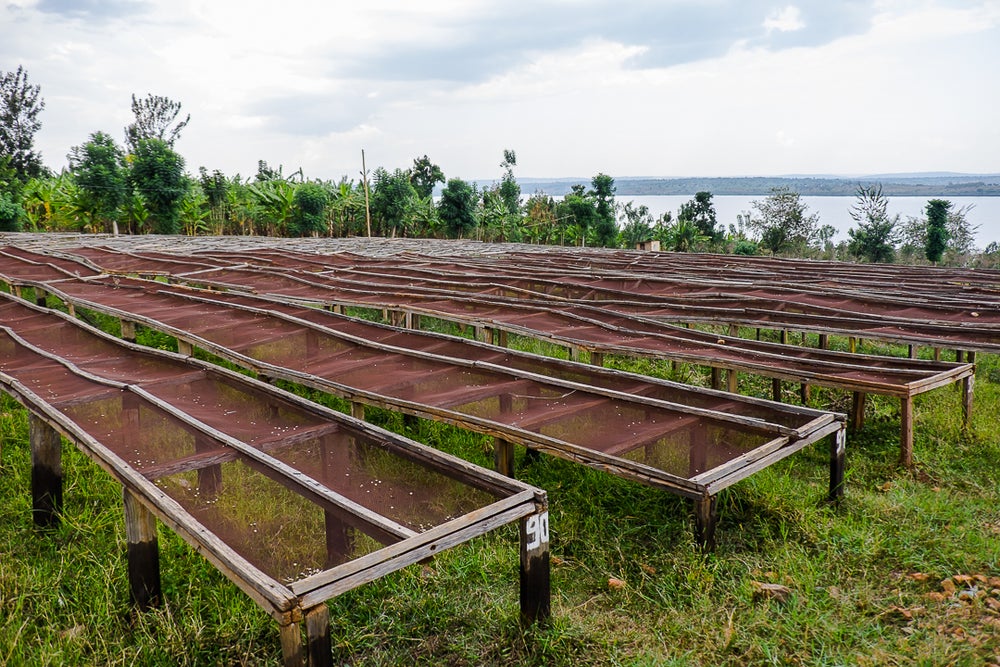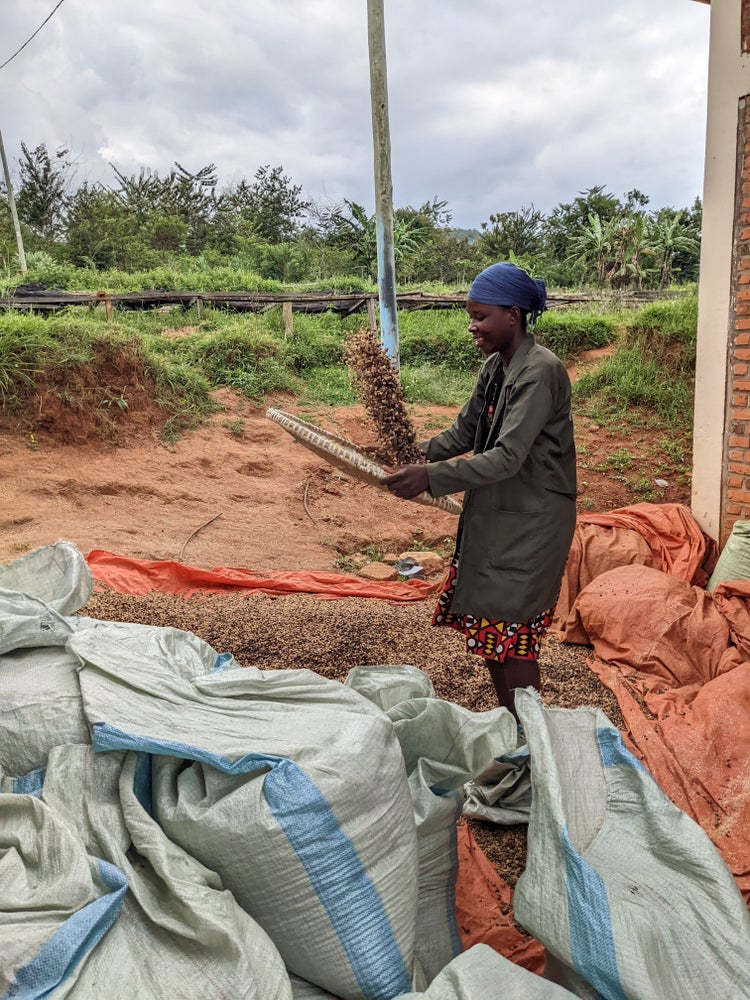About This Coffee
Karenge holds the distinction of being the first washing station that RWACOF (Sucafina in Rwanda) purchased. Acquired in 2006, Sucafina Rwanda has grown to include 22 washing stations, but Karenge is still one of Sucafina Rwanda’s darlings.
Through Karenge, coffee growers surrounding the station can increase their income while minimizing their labor. Previously, most growers sold semi-washed parchment to local traders. With Karenge, they can sell cherry to the station and site collection points located around the station and make better premiums when their cherry is processed into high-quality coffee.
Harvest & Post-Harvest
After purchasing cherry from producers, Karenge sends the cherry through a strict sorting process. First, washing station staff remove any lower quality cherry through flotation. Then, a specially trained staff visually inspects the remaining cherry for any visual defects.
After selection and rinsing, the cherries go straight to the raised beds. They are spread out in a very thin layer and raked frequently to ensure even drying. It takes around 3 weeks for the cherries to dry on the raised beds
RWACOF (Sucafina in Rwanda)
In concert with our sustainability partner, Kahawatu Foundation, RWACOF invests heavily in yield improvements, farmer training, quality improvement projects, environmental sustainability and other ways to increase farmer livelihoods.
RWACOF’s Farmer Development Program in partnership with the London School of Economics (LSE) supports farmers with training in Good Agricultural Practices and access to loans, farm inputs and farm services. A new soil health initiative uses soil analysis data that RWACOF collected to identify farms where soil is too acidic. Lime, along with education about application, is distributed to these farmers to help improve soil quality. Additionally, seedling nurseries provide up to 4 million seedlings per year to help farmers renovate their rootstock.
RWACOF also has many projects that are designed to support farmers’ overall livelihoods. They focus on gender equality and support several women’s cooperatives by helping them access land, seedlings and reach a market for their coffees. They offer trainings on financial literacy and alternative income-generating activities.
The Farmer Hub program built retail shops that buy other crops from farmers and sell them to families and schools at fair prices. These retail shops help promote income diversification by creating a market for other crops and they supply nutritious foods at competitive prices. The Farmer Hub program also offers loans to farmers as part of the farm management program.
On the environmental side, RWACOF has worked with partners to help install solar panels at 2 washing stations that are off the electrical grid. RWACOF’s dry mill already have a 50 kilowatt-per-hour solar panel set up on their roof. They’ve also mapped carbon emissions in their coffee supply chain and are starting projects to half their emissions per kg of coffee. Two ways they’re accomplishing this is by facilitating a transition from inorganic to organic fertilizer and further improve waste (water and pulp) management at the wet mills. They’re also working with Trade in Space to map deforestation in the supply chain so that they can begin to work with farmers to reduce deforestation and improve forested areas in the supply chain.
Above all, RWACOF's exceptional attention to detail during post-harvest activities ensures the best quality coffee possible. From the moment cherry enters the washing station until it is milled and bagged for export, RWACOF keeps stringent quality controls in place. They know, as we do, that high-quality coffee is crucial for delivering benefit all along the supply chain.
Coffee in Rwanda
Despite its turbulent history, today Rwanda is one of the specialty coffee world’s darlings – for good reason! Our sister company in Rwanda does an amazing job of bringing the best that Rwanda has to offer to roasters around the world.
German missionaries and settlers brought coffee to Rwanda in the early 1900s. Largescale coffee production was established during the 1930 & 1940s by the Belgian colonial government. Coffee production continued after the Belgian colonists left. By 1970, coffee had become the single largest export in Rwanda and accounted for 70% of total export revenue. Coffee was considered so valuable that, beginning in 1973, it was illegal to tear coffee trees out of the ground.
Between 1989 and 1993, the breakdown of the International Coffee Agreement (ICA) caused the global price to plummet. The Rwandan government and economy took a hard hit from low global coffee prices. The 1994 genocide and its aftermath led to a complete collapse of coffee exports and vital USD revenue, but the incredible resilience of the Rwandan people is evident in the way the economy and stability have recovered since then.
Modern Rwanda is considered one of the most stable countries in the region. Since 2003, its economy has grown by 7-8% per year and coffee production has played a key role in this economic growth. Coffee has also played a role in Rwanda's significant advancements towards gender equality. New initiatives that cater to women and focus on helping them equip themselves with the tools and knowledge for farming have been changing the way women view themselves and interact with the world around them.
Today, smallholders propel the industry in Rwanda forward. The country doesn’t have any large estates. Most coffee is grown by the 400,000+ smallholders, who own less than a quarter of a hectare. The majority of Rwanda’s coffee production is Arabica. Bourbon variety plants comprise 95% of all coffee trees cultivated in Rwanda.

